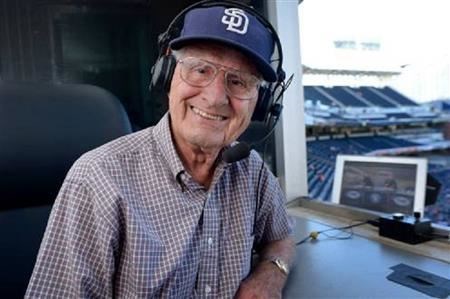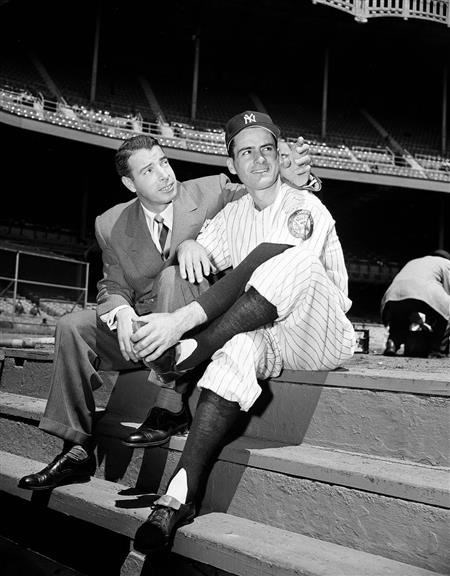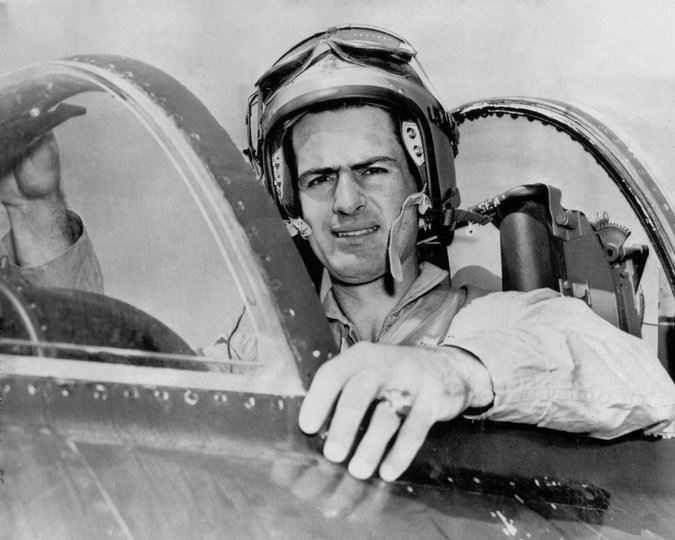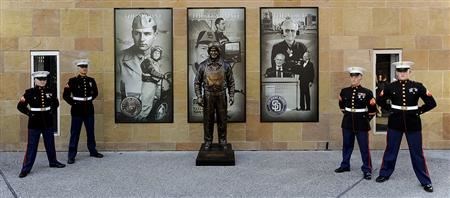Jerry Coleman: A True Hero Hero: "a person admired for achievements and noble qualities" (Merriam-Webster). Based on the definition from Merriam-Webster Dictionary, to be called a hero, someone has to have great achievements and noble qualities. Gerald Francis Coleman is a textbook example of a hero. Born in 1924 in San Jose, California, "Jerry" was a two-sport star in high school, excelling in basketball and baseball (Coleman). When Coleman turned 18, he enlisted in the Marine Corp as a pilot, and flew combat missions in World War II. Once back, he became a member of the New York Yankees, winning four World Series along with teammates such as future Hall-of-Famers Mickey Mantle, Joe DiMaggio and Phil Rizzuto. Coleman's MLB career came to an abrupt end when he decided to again enlist in the Marines, this time during the Korean War. After returning back a two-time war veteran, he retired from baseball and began his broadcasting career, in which he broadcasted games for the San Diego Padres for 42 years (Brock). For a person to be given the title of a hero, they must present noble qualities, such as humbleness and sacrifice. Jerry Coleman, nicknamed "The Colonel" was a deserving hero because of his humbleness and his sacrifice, making him an inspiration to many.
 |
| Coleman broadcasted Padres games for over 40 years (90feetofperfection.com) |
Jerry Coleman was a deserving hero because of his humbleness. Everyone who knew Coleman would say one thing: he was one of the most humble people they ever met: "Even in his later years, when he had more than enough time to be introspective about his life and all he accomplished, Coleman did his best to steer clear of the spotlight. Coleman never understood what all the fuss was about and would much rather talk about his buddy -- 11-year-old German shepherd Gus -- who he dutifully took for walks each morning before sunrise near his home in La Jolla" (Brock). Coleman never liked to be recognized, and always tried to stay out of the limelight. Coleman was so humble that he even said he hated public speaking because it drew too much attention to him: "The Yankees had a going-away ceremony for me on April 30. Any time I have to make a speech I have emotions of fear. I hate it. I think most people do, unless you're an egotist and can't stand not to be in front of people. I never needed that" (Coleman). Coleman was humble to such an extent that he hated making speeches because of all the attention it brings to him. Though he obviously had a life worthy of showing off, Jerry Coleman hated talking about himself and would always steer clear from attention given to him.
 |
| Coleman(right), along with teammate Joe DiMaggio (wirednewyork.com) |
Jerry Coleman was also a hero because of his sacrifices. When Pearl Harbor was bombed in 1941, Coleman made a selfless decision: "Coleman was such a good athlete that he was given a scholarship to play baseball and basketball at USC -- 'I wasn't a good shot, but I could run like the devil,' he said -- but those plans were interrupted when the Japanese bombed Pearl Harbor in December of his senior year of high school. 'That changed everything,' Coleman said" (Brock). Coleman had a promising future as a professional baseball player, but as soon as Pearl Harbor was attacked, he didn't think twice about putting his career on hold to protect his country. Though playing baseball was his childhood dream, Jerry knew that his career wasn't nearly as important as his country. As soon as he turned 18, Coleman enlisted in the Marine Corps as a fighter pilot and flew in 57 combat missions (Coleman). Jerry Coleman sacrificed his childhood dream to fight for his country in World War 2, which not only put his baseball career at risk, but also his life. Serving in World War 2 was not the only time Coleman sacrificed his career to serve his country: "Coleman spent some seven decades in pro baseball, a career that included four World Series titles with the Yankees and was interrupted by his service in World War II and the Korean War" (Jerry Coleman, foreword by Richard Goldstein). Not only did Jerry Coleman serve in World War II, but he later returned to the Marine Corps to fight in the Korean War, this time as a decorated player with the New York Yankees. Coleman twice sacrificed his career to protect his country, flying in 120 combat missions total. While many players served in the Korean War, Coleman was the only player ever to see combat in two wars. Coleman's sacrifice was shown when he voluntarily enlisted in the Korean War, despite being in the middle of a season with the Yankees: "I went from Yankees pinstripes to a Marine Corps uniform within hours. The night of that Sunday farewell ceremony at the Stadium I boarded a plane for California and I was soon regaining my pilot skills" (Coleman). Jerry Coleman decided to forgo the rest of his career to serve his country for the second time. This was a huge sacrifice because this ultimately cost him the rest of his playing career with the Yankees. When he returned from Korea as a two-time war veteran, he attempted to revive his playing career, but had gotten too old, so he retired. Though his MLB career was cut short due to his service in the military, Coleman always said he would do it again in a heartbeat (Coleman). Coleman's sacrifice was an extremely selfless one, giving up his career and his childhood dream to protect his country.
 |
| "The Colonel" flew in 120 combat missions total (www.nytimes.com) (Associated Press) |
Through his humbleness and sacrifice, "Colonel" Jerry Coleman became a deserving hero. Coleman was a selfless person who made a great sacrifice to his country, yet remained humble and never liked to talk about himself. Coleman was an inspiration because of how he lived his life and the way he lived his life. Jerry Coleman "was a Marine Corps aviator in both World War II and the Korean War. And he was an All-Star second baseman for the dynastic New York Yankees who once was Most Valuable Player of a World Series" (Jenkins). Jerry Coleman inspired me personally because he lived his life to the maximum. Coleman lived an inspirational life, serving his country twice, but he also lived my dream, playing Major League Baseball and broadcasting Padres games for over 40 years. There are many different definitions of the word "hero" and based on many of them, including the one provided by Merriam-Webster, Jerry Coleman was a true hero.
 |
| Jerry Coleman's statue stands tall at Petco Park (www.hanlonsculpture.com) |
Works Cited Brock, Corey. "San Diego Padres Announcer Jerry Coleman Dies at 89." San Diego Padres, Padres, 5 Jan. 2014, Coleman, Jerry, and Richard Goldstein. An American Journey: My Life on the Field, in the Air, and on the Air. Chicago, Triumph Books, 2008. Jenkins, Chris. "Padres Legend Jerry Coleman Has Died." Sandiegouniontribune.com, The San Diego Union-Tribune, 5 Jan. 2014, Accessed 27 Apr. 2017. Jerry Coleman Dies at 89." ESPN, ESPN Internet Ventures, 6 Jan. 2014,
Page created on 5/21/2017 12:00:00 AM
Last edited 5/21/2017 12:00:00 AM
